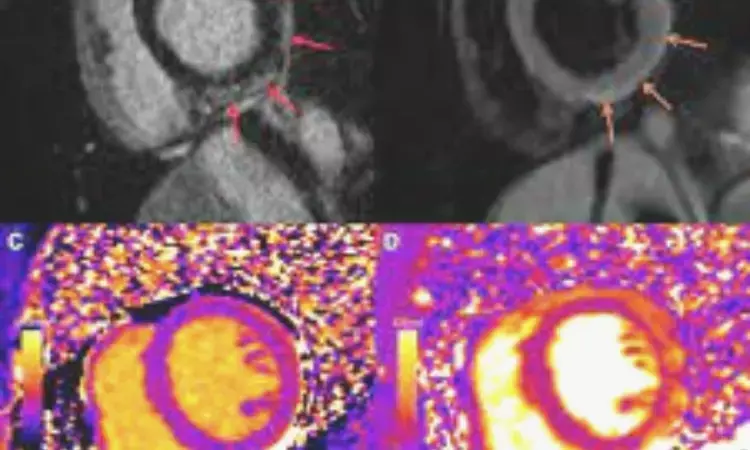- Home
- Medical news & Guidelines
- Anesthesiology
- Cardiology and CTVS
- Critical Care
- Dentistry
- Dermatology
- Diabetes and Endocrinology
- ENT
- Gastroenterology
- Medicine
- Nephrology
- Neurology
- Obstretics-Gynaecology
- Oncology
- Ophthalmology
- Orthopaedics
- Pediatrics-Neonatology
- Psychiatry
- Pulmonology
- Radiology
- Surgery
- Urology
- Laboratory Medicine
- Diet
- Nursing
- Paramedical
- Physiotherapy
- Health news
- Fact Check
- Bone Health Fact Check
- Brain Health Fact Check
- Cancer Related Fact Check
- Child Care Fact Check
- Dental and oral health fact check
- Diabetes and metabolic health fact check
- Diet and Nutrition Fact Check
- Eye and ENT Care Fact Check
- Fitness fact check
- Gut health fact check
- Heart health fact check
- Kidney health fact check
- Medical education fact check
- Men's health fact check
- Respiratory fact check
- Skin and hair care fact check
- Vaccine and Immunization fact check
- Women's health fact check
- AYUSH
- State News
- Andaman and Nicobar Islands
- Andhra Pradesh
- Arunachal Pradesh
- Assam
- Bihar
- Chandigarh
- Chattisgarh
- Dadra and Nagar Haveli
- Daman and Diu
- Delhi
- Goa
- Gujarat
- Haryana
- Himachal Pradesh
- Jammu & Kashmir
- Jharkhand
- Karnataka
- Kerala
- Ladakh
- Lakshadweep
- Madhya Pradesh
- Maharashtra
- Manipur
- Meghalaya
- Mizoram
- Nagaland
- Odisha
- Puducherry
- Punjab
- Rajasthan
- Sikkim
- Tamil Nadu
- Telangana
- Tripura
- Uttar Pradesh
- Uttrakhand
- West Bengal
- Medical Education
- Industry
COVID-19 vaccine-associated myocarditis milder, confirms Cardiac MRI based study

Canada: Cardiac MRI shows the presence of a similar pattern of myocardial injury in myocarditis associated with the COVID-19 vaccine compared to myocarditis caused by other factors, says a recent study in the journal Radiology. Abnormalities although were found to be less severe, with no adverse events, and less frequent septal involvement over short-term follow-up.
Myocarditis is a non-ischemic inflammatory disease of the heart muscle (myocardium), with diverse causes, clinical patterns, and outcomes. Myocarditis after immunization is a rare occurrence that recently has received increased attention recently due to reports of myocardial injury in a minority of patients who received messenger RNA (mRNA) based COVID-19 vaccines. However, there is not much data on the pattern and severity of myocardial injury in patients with COVID-19 vaccination-associated myocarditis.
Against the above background, Matteo Fronza, Department of Medical Imaging, Women's College Hospital, University of Toronto, Toronto, and colleagues aimed to describe myocardial injury following COVID-19 vaccination compared these findings to other causes of myocarditis in a retrospective cohort study.
The study included consecutive adult patients with myocarditis with at least one T1-based and at least one T2-based abnormality on cardiac MRI performed at a tertiary referral hospital between 2019-2021. Patients were categorized into three groups: myocarditis following COVID-19 vaccination, myocarditis following COVID-19 illness, and other myocarditis not associated with COVID-19 vaccination or illness.
The study yielded the following findings:
· Of the 92 included patients, 21 (22%) had myocarditis following COVID-19 vaccination (mean age 31 years ±14; 17 men; mRNA-1273 in 12 [57%] and BNT162b2 in 9 [43%]).
· Ten patients (11%) had myocarditis following COVID-19 illness (mean age 51 years ±14; 3 men), and 61 (66%) had other myocarditis (mean age 44 years ±18; 36 men).
· MRI findings in vaccine-associated myocarditis included late gadolinium enhancement (LGE) in 17 (81%) and left ventricular dysfunction in 6 (29%).
· Compared with other causes of myocarditis, patients with vaccine-associated myocarditis had higher left ventricular ejection fraction and less extensive LGE, even after controlling for age, sex, and duration between symptom onset and MRI.
· The most frequent location of LGE in all groups was subepicardial at the basal inferolateral wall, although septal involvement was less common in vaccine-associated myocarditis.
· At short-term follow-up (median 22 days), all patients with vaccine-associated myocarditis were asymptomatic with no adverse events.
To conclude, the study demonstrates that the pattern of MRI abnormalities in vaccine-associated myocarditis is similar to other causes although patient demographics differ and MRI findings tend to be less severe.
Reference:
The study titled, Myocardial Injury Pattern at MRI in COVID-19 Vaccine–associated Myocarditis," was published in the journal Radiology.
Dr Kamal Kant Kohli-MBBS, DTCD- a chest specialist with more than 30 years of practice and a flair for writing clinical articles, Dr Kamal Kant Kohli joined Medical Dialogues as a Chief Editor of Medical News. Besides writing articles, as an editor, he proofreads and verifies all the medical content published on Medical Dialogues including those coming from journals, studies,medical conferences,guidelines etc. Email: drkohli@medicaldialogues.in. Contact no. 011-43720751


